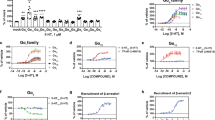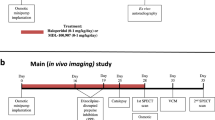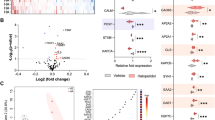Abstract
Glycogen synthase kinase 3 (GSK3) was recently suggested to be a potential target of psychotropics used in psychiatric illnesses such as schizophrenia and bipolar disorder. Relevant studies have found that antipsychotic drugs regulate GSK3 activity via an increase in either inhibitory serine phosphorylation or amount of GSK3 after acute or subchronic treatment. Recent evidence shows that GSK3 is regulated by dopaminergic or serotonergic systems implicated in the pathophysiology and treatment mechanisms of schizophrenia and bipolar disorder. Therefore, antipsychotics may regulate GSK3 via antagonizing dopaminergic or serotonergic activity. However, the signaling pathway that is involved in GSK3 regulation by dopaminergic or serotonergic systems has not been well established. Haloperidol is a typical antipsychotic with potent dopamine D2 receptor antagonism. Clozapine is an atypical antipsychotic with potent serotonin 5HT2 receptor antagonism. We injected rats with haloperidol or clozapine and examined the phosphorylation and amount of GSK3α/β and its well-known upstream regulators Akt and Dvl in the rat frontal cortex by Western blotting. Both haloperidol and clozapine induced Ser21/9 phosphorylation of GSK3GSK3α/β. Haloperidol increased the Ser473 phosphorylation of Akt transiently, whereas clozapine maintained the increase for 1 h. Haloperidol did not affect the phosphorylation and amount of Dvl, whereas clozapine increased both phosphorylation and the amount of Dvl. Our results suggest that GSK3 activity may be regulated by both typical and atypical antipsychotics and that Akt or Dvl, depending on the D2- or 5HT2- receptor antagonism properties of typical and atypical antipsychotics, mediate the regulation differently.
Similar content being viewed by others
Article PDF
Author information
Authors and Affiliations
Rights and permissions
This is an Open Access article distributed under the terms of the Creative Commons Attribution Non-Commercial License (http://creativecommons.org/licenses/by-nc/3.0/) which permits unrestricted non-commercial use, distribution, and reproduction in any medium, provided the original work is properly cited.
About this article
Cite this article
Roh, MS., Seo, M., Kim, Y. et al. Haloperidol and clozapine differentially regulate signals upstream of glycogen synthase kinase 3 in the rat frontal cortex. Exp Mol Med 39, 353–360 (2007). https://doi.org/10.1038/emm.2007.39
Published:
Issue date:
DOI: https://doi.org/10.1038/emm.2007.39
Keywords
This article is cited by
-
AKT inhibition in the central nervous system induces signaling defects resulting in psychiatric symptomatology
Cell & Bioscience (2022)
-
mTOR kinase activity disrupts a phosphorylation signaling network in schizophrenia brain
Molecular Psychiatry (2021)
-
Modulating NMDA receptors to treat MK-801-induced schizophrenic cognition deficit: effects of clozapine combining with PQQ treatment and possible mechanisms of action
BMC Psychiatry (2020)
-
Transcriptional signatures of participant-derived neural progenitor cells and neurons implicate altered Wnt signaling in Phelan-McDermid syndrome and autism
Molecular Autism (2020)
-
Downregulated AKT-mTOR signaling pathway proteins in dorsolateral prefrontal cortex in Schizophrenia
Neuropsychopharmacology (2020)



